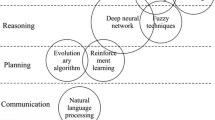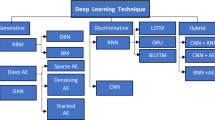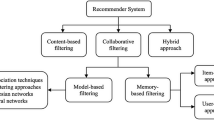Abstract
With the dramatic rise of internet users in the last decade, there has been a massive rise in the number of daily web searches. This leads to a plethora of data available online, which is growing by the days. A recommendation engine leverages this massive amount of data by finding patterns of user behavior. Movie recommendation for users is one of the most prevalent implementations. Although it goes way back in the history of recommendation engines, collaborative filtering is still the most predominant method when it comes to the underlying technique implemented in recommendation engines. The main reasons behind that are its simplicity and flexibility. However, collaborative filtering has always suffered from the Cold-Start problem. When a new movie enters the rating platform, we do not have any user interaction for the movie. The foundation of collaborative filtering is based on the user-movie rating. In this paper, we have proposed a hybrid filtering to combat this problem using the genre labeled for a new movie. The proposed algorithm utilizes the nonlinear similarities among various movie genres and predicts the rating of a user for the new movie with the associated genres for the movie.















Similar content being viewed by others
References
Adomavicius, G., & Tuzhilin, A. (2005). Toward the next generation of recommender systems: a survey of the state-of-the-art and possible extensions. IEEE Transactions on Knowledge & Data Engineering, 6, 734–749.
Aggarwal, C.C. (2016). An introduction to recommender systems. In Recommender systems (pp. 1–28): Springer.
Bansal, S., Gupta, C., & Arora, A. (2016). User tweets based genre prediction and movie recommendation using lsi and svd. In 2016 Ninth International Conference on Contemporary Computing (IC3) (pp. 1–6): IEEE.
Basu, C., Hirsh, H., Cohen, W., & et al. (1998). Recommendation as classification: Using social and content-based information in recommendation. In Aaai/iaai (pp. 714–720).
Billsus, D., & Pazzani, M.J. (1998). Learning collaborative information filters. In Icml, (Vol. 98 pp. 46–54).
Burke, R. (2002). Hybrid recommender systems: Survey and experiments. User modeling and user-adapted interaction, 12(4), 331–370.
Choi, S.-M., & Han, Y.-S. (2010). A content recommendation system based on category correlations. In 2010 Fifth International Multi-conference on Computing in the Global Information Technology (pp. 66–70): IEEE.
Deldjoo, Y., Elahi, M., & Cremonesi, P. (2016). Using visual features and latent factors for movie recommendation. CEUR-WS.
Deldjoo, Y., Elahi, M., Quadrana, M., & Cremonesi, P. (2015). Toward building a content-based video recommendation system based on low-level features. In International Conference on Electronic Commerce and Web Technologies (pp. 45–56): Springer.
Denton, A.M., & Roy, A. (2017). Cluster-overlap algorithm for assessing preprocessing choices in environmental sustainability. In 2017 IEEE International Conference on Big Data (Big Data) (pp. 4212–4220): IEEE.
Eisma, R. (2020). Attitudes towards dutch subtitling and dubbing.
Felfernig, A., Polat-Erdeniz, S., Uran, C., Reiterer, S., Atas, M., Tran, T.N.T., Azzoni, P., Kiraly, C., & Dolui, K. (2019). An overview of recommender systems in the internet of things. Journal of Intelligent Information Systems, 52(2), 285–309.
Fleischman, M., & Hovy, E. (2003). Recommendations without user preferences: a natural language processing approach. In IUI, (Vol. 3 pp. 242–244). Citeseer.
Gomez-Uribe, C.A., & Hunt, N. (2015). The netflix recommender system: Algorithms, business value, and innovation. ACM Transactions on Management Information Systems (TMIS), 6(4), 1–19.
Guo, G., Zhang, J., & Thalmann, D. (2014). Merging trust in collaborative filtering to alleviate data sparsity and cold start. Knowledge-Based Systems, 57, 57–68.
Guo, L., Liang, J., Zhu, Y., Luo, Y., Sun, L., & Zheng, X. (2019). Collaborative filtering recommendation based on trust and emotion. Journal of Intelligent Information Systems, 53(1), 113–135.
Gupta, A., Yadav, O.P., Roy, A., DeVoto, D., & Major, J. (2019). Degradation modeling and reliability assessment of capacitors. In International Electronic Packaging Technical Conference and Exhibition, (Vol. 59322 p. V001T06A018): American Society of Mechanical Engineers.
Harper, F.M., & Konstan, J.A. (2015). The movielens datasets: History and context. ACM Transactions on Interactive Intelligent Systems (TIIS), 5(4), 1–19.
Henriques, P.M., & Mendes-Moreira, J. (2016). Combining recommendation systems with a dynamic weighted technique. In 2016 Eleventh International Conference on Digital Information Management (ICDIM) (pp. 203–208).
Jannach, D., Lerche, L., Kamehkhosh, I., & Jugovac, M. (2015). What recommenders recommend: an analysis of recommendation biases and possible countermeasures. User Modeling and User-Adapted Interaction, 25(5), 427–491.
Kiran, R., Kumar, P., & Bhasker, B. (2020). Dnnrec: a novel deep learning based hybrid recommender system. Expert Systems with Applications, 144, 113054.
Ko, S.-K., Choi, S.-M., Eom, H.-S., Cha, J.-W., Cho, H., Kim, L., & Han, Y.-S. (2011). A smart movie recommendation system. In Symposium on Human Interface (pp. 558–566): Springer.
Koren, Y., Bell, R., & Volinsky, C. (2009). Matrix factorization techniques for recommender systems. Computer, 42(8), 30–37.
kumar Bokde, D., Girase, S., & Mukhopadhyay, D. (2015). Role of matrix factorization model in collaborative filtering algorithm: a survey. CoRR, 1503.07475.
Lika, B., Kolomvatsos, K., & Hadjiefthymiades, S. (2014). Facing the cold start problem in recommender systems. Expert Systems with Applications, 41 (4), 2065–2073.
Netflix, I. (2013). The netflix prize.
Nobahari, V., Jalali, M., & Mahdavi, S.J.S. (2019). Isotrustseq: a social recommender system based on implicit interest, trust and sequential behaviors of users using matrix factorization. Journal of Intelligent Information Systems, 52 (2), 239–268.
Ricci, F., Rokach, L., & Shapira, B. (2011). Introduction to recommender systems handbook. In Recommender systems handbook (pp. 1–35): Springer.
Roy, A., & Denton, A. (2019). Nearest-neighbor-intersection algorithm for identifying strong predictors using high-dimensional data. In 2019 IEEE International Conference on Electro Information Technology (EIT) (pp. 416–421): IEEE.
Sahebi, S., & Cohen, W.W. (2011). Community-based recommendations: a solution to the cold start problem. In Workshop on recommender systems and the social web, RSWEB (p. 60).
Sarwar, B., Karypis, G., Konstan, J., & Riedl, J. (2000). Application of dimensionality reduction in recommender system-a case study. Technical report, Minnesota Univ Minneapolis Dept of Computer Science.
Sarwar, B., Karypis, G., Konstan, J., & Riedl, J. (2001). Item-based collaborative filtering recommendation algorithms. In Proceedings of the 10th international conference on World Wide Web (pp. 285–295).
Shahraki, A.F., Roy, A., Yadav, O.P., & Rathore, A.P.S. (2019). Predicting remaining useful life based on instance-based learning. In 2019 Annual Reliability and Maintainability Symposium (RAMS) (pp. 1–6): IEEE.
Shokeen, J., & Rana, C. (2019). Social recommender systems: techniques, domains, metrics, datasets and future scope. Journal of Intelligent Information Systems, 1–35.
Srivastava, A., Bala, P.K., & Kumar, B. (2020). New perspectives on gray sheep behavior in e-commerce recommendations. Journal of Retailing and Consumer Services, 53.
Su, X., & Khoshgoftaar, T.M. (2009). A survey of collaborative filtering techniques. Advances in Artificial Intelligence, 2009.
Van Setten, M. (2002). Experiments with a recommendation technique that learns category interests. In ICWI (pp. 722–725).
Vargas, S., Baltrunas, L., Karatzoglou, A., & Castells, P. (2014). Coverage, redundancy and size-awareness in genre diversity for recommender systems. In Proceedings of the 8th ACM Conference on Recommender systems (pp. 209–216): ACM.
Yao, Q., Chen, X., Kwok, J.T., Li, Y., & Hsieh, C.-J. (2020). Efficient neural interaction function search for collaborative filtering. In Proceedings of The Web Conference, (Vol. 2020 pp. 1660–1670).
Zatevakhina, A., Dedyukhina, N., & Klioutchnikov, O. (2019). Recommender systems-the foundation of an intelligent financial platform: Prospects of development. In 2019 International Conference on Artificial Intelligence: Applications and Innovations (IC-AIAI) (pp. 104–1046): IEEE.
Author information
Authors and Affiliations
Corresponding author
Additional information
Availability of data and material
Data set investigated is freely available
Code Availability
Code will be made available once the paper is accepted
Publisher’s note
Springer Nature remains neutral with regard to jurisdictional claims in published maps and institutional affiliations.
Rights and permissions
About this article
Cite this article
Roy, A., Ludwig, S.A. Genre based hybrid filtering for movie recommendation engine. J Intell Inf Syst 56, 485–507 (2021). https://doi.org/10.1007/s10844-021-00637-w
Received:
Revised:
Accepted:
Published:
Issue Date:
DOI: https://doi.org/10.1007/s10844-021-00637-w




